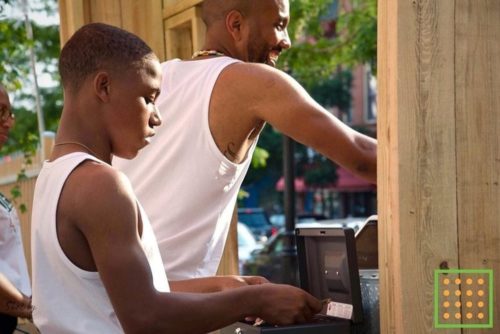Several years ago, before he started Wilmington Green Box, a nonprofit that places at-risk teens in entrepreneurial jobs while supplying urban communities with healthy goods, Jason Aviles turned his daily routine of doing yoga on the Riverfront into a yoga class when employees from the nearby AAA building noticed him from their office windows and wanted to join in.
When it comes to wellness, Aviles has proven he can make things happen, even with minimal capital.
When he founded Wilmington Green Box in 2016 with business partner John Naughton, it was a mobile food cart (made from and old freezer out of a 1940s Victorian home) that brought locally-sourced healthy foods directly to residents of food deserts in downtown Wilmington. A year later, with the support of Downtown Visions and the Buccini/Pollin Group, the cofounders opened the Market Street outdoor kiosk, taking over an unused strip of green space near 4th and Market. They brought on Emmanuel Knotts, the first teen to work with the program, as Youth Supervisor and hired more under-resourced teens.
This summer, Green Box has a commercial kitchen to work out of, thanks to the Big Fish Grill Group, which has made a deal with Aviles to use to use their Washington Street Ale House kitchen two times a week to make cold-pressed juices, as well at Harvest House at 12th and Washington Street (formerly Presto), also owned by Big Fish.
Green Box has even been in talks with Peter DiPrinzio and Chris Buccini about having a stall at DECO, the much-anticipated food hall that will open in the DuPont Building in 2019.
All of this has been done on a shoestring. Aviles participated in the Spark Challenge at The Mill in 2017, which combines mentoring with a pitch competition and access to potential investors. And he keeps looking for new and creative ways to fund the growing nonprofit business.
As it happened, a University of Delaware–sponsored crowdfunding startup called USEED — now known as Funderbolt — was trying to branch out from its restrictive focus demographic of educational institutions.
“Princeton would have 900 student clubs and they would allow two clubs raise money on our platform,” said John Moore, chairman of Funderbolt. “We don’t need the permission of the institution. We decided to go straight to the student groups.”
This more direct way of doing business led them into a new territory: community organization funding. And Wilmington Green Box was ready and willing to try the platform out.
Unlike other crowdfunding platforms like Kickstarter and GoFundMe, Funderbolt has an onboarding process and coaching throughout the campaign.
“It’s a lot more involved [than other crowdfunding platforms],” said Aviles. “You learn how to go about more effectively set up your company for success.”
So far, Wilmington Green Box has raised more than $33,000, or 60 percent of its goal, including $15,000 from Capital One, a donation match for raising the first $15,000 from the community.
“It starts with small gifts to build a culture of philanthropy,” said Moore. “Delaware has one of the lowest levels of donations to charity — that has to change. We have to get over people saying ‘my donation doesn’t matter.’ A person who gives 5 or 10 dollars can stand shoulder to shoulder with a du Pont. When a hundred smaller donors give, that inspires the bigger corporate donor. Small gifts become magnetic for the big gifts and the big gifts become magnetic to the small ones.”
For Aviles, the format took some getting used to. “It requires a level of openness to receive and not feel like you’re lesser than,” he said. “Because we had never asked for help. The coaching helped us to switch to a more empowering mindset.”
There’s still time to support the Wilmington Green Box campaign, which ends Sept. 10. You can see the WGB Funderbolt page here.
Before you go...
Please consider supporting Technical.ly to keep our independent journalism strong. Unlike most business-focused media outlets, we don’t have a paywall. Instead, we count on your personal and organizational support.
3 ways to support our work:- Contribute to the Journalism Fund. Charitable giving ensures our information remains free and accessible for residents to discover workforce programs and entrepreneurship pathways. This includes philanthropic grants and individual tax-deductible donations from readers like you.
- Use our Preferred Partners. Our directory of vetted providers offers high-quality recommendations for services our readers need, and each referral supports our journalism.
- Use our services. If you need entrepreneurs and tech leaders to buy your services, are seeking technologists to hire or want more professionals to know about your ecosystem, Technical.ly has the biggest and most engaged audience in the mid-Atlantic. We help companies tell their stories and answer big questions to meet and serve our community.
Join our growing Slack community
Join 5,000 tech professionals and entrepreneurs in our community Slack today!

The person charged in the UnitedHealthcare CEO shooting had a ton of tech connections

From rejection to innovation: How I built a tool to beat AI hiring algorithms at their own game

Where are the country’s most vibrant tech and startup communities?



